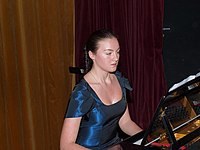
Nikolai Andreyevich Rimsky-Korsakov was a Russian composer, a member of the group of composers known as The Five. He was a master of orchestration. His best-known orchestral compositions—Capriccio Espagnol, the Russian Easter Festival Overture, and the symphonic suite Scheherazade—are staples of the classical music repertoire, along with suites and excerpts from some of his 15 operas. Scheherazade is an example of his frequent use of fairy-tale and folk subjects.

Mily Alexeyevich Balakirev was a Russian composer, pianist, and conductor known today primarily for his work promoting musical nationalism and his encouragement of more famous Russian composers, notably Pyotr Ilyich Tchaikovsky. He began his career as a pivotal figure, extending the fusion of traditional folk music and experimental classical music practices begun by composer Mikhail Glinka. In the process, Balakirev developed musical patterns that could express overt nationalistic feeling. After a nervous breakdown and consequent sabbatical, he returned to classical music but did not wield the same level of influence as before.
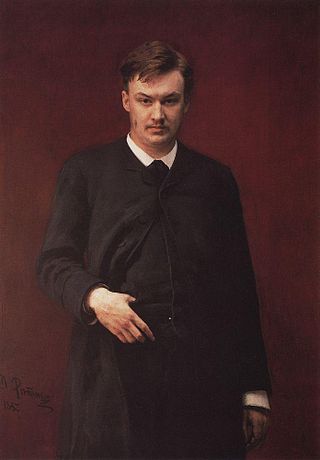
Alexander Konstantinovich Glazunov was a Russian composer, music teacher, and conductor of the late Russian Romantic period. He was director of the Saint Petersburg Conservatory between 1905 and 1928 and was instrumental in the reorganization of the institute into the Petrograd Conservatory, then the Leningrad Conservatory, following the Bolshevik Revolution. He continued as head of the Conservatory until 1930, though he had left the Soviet Union in 1928 and did not return. The best-known student under his tenure during the early Soviet years was Dmitri Shostakovich.
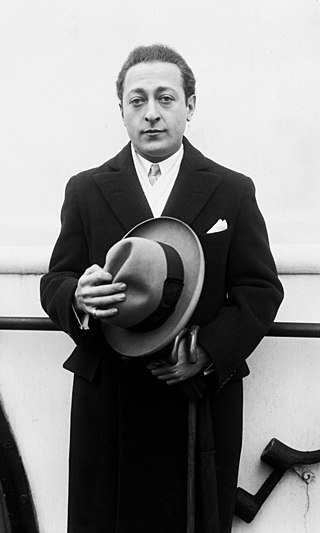
Jascha Heifetz was a Lithuanian-American violinist. He is widely regarded as one of the greatest violinists of all time. Born in Vilnius, he moved to the United States as a teenager, where his Carnegie Hall debut was rapturously received. He was a virtuoso from childhood. Fritz Kreisler, another leading violinist of the twentieth century, said after hearing Heifetz's debut, "We might as well take our fiddles and break them across our knees." He had a long and successful performing career; however, after an injury to his right (bowing) arm, he switched his focus to teaching.
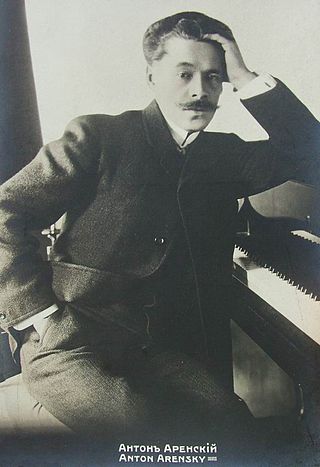
Anton Stepanovich Arensky was a Russian composer of Romantic classical music, a pianist and a professor of music.

Night on Bald Mountain, also known as Night on the Bare Mountain, is a series of compositions by Modest Mussorgsky (1839–1881). Inspired by Russian literary works and legend, Mussorgsky composed a "musical picture", St. John's Eve on Bald Mountain on the theme of a Witches' Sabbath occurring at Bald Mountain on St. John's Eve, which he completed on that very night, 23 June 1867. Together with Nikolai Rimsky-Korsakov's Sadko (1867), it is one of the first tone poems by a Russian composer.

The N. A. Rimsky-Korsakov Saint Petersburg State Conservatory is a school of music in Saint Petersburg, Russia. In 2004, the conservatory had around 275 faculty members and 1,400 students.

Sergey Ivanovich Taneyev was a Russian composer, pianist, teacher of composition, music theorist and author.
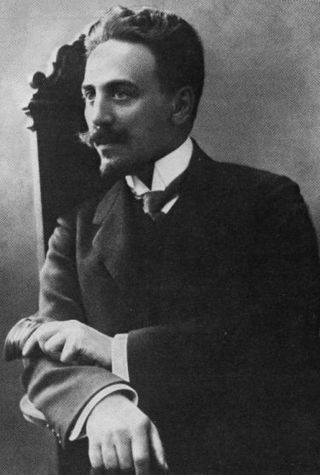
Felix Mikhailovich Blumenfeld was a Russian and Soviet composer, conductor of the Imperial Opera St-Petersburg, pianist, and teacher.
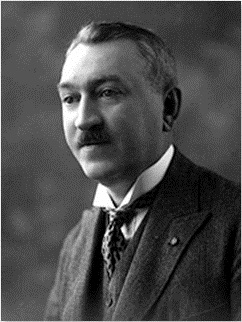
Nikolai Nikolayevich Tcherepnin was a Russian composer, pianist, and conductor. He was born in Saint Petersburg and studied under Nikolai Rimsky-Korsakov at the Saint Petersburg Conservatory. He conducted for the first Paris season of Sergei Diaghilev's Ballets Russes.

The Lithuanian Academy of Music and Theatre in Vilnius, Lithuania, is a state-supported conservatory that trains students in music, theatre, and multimedia arts.
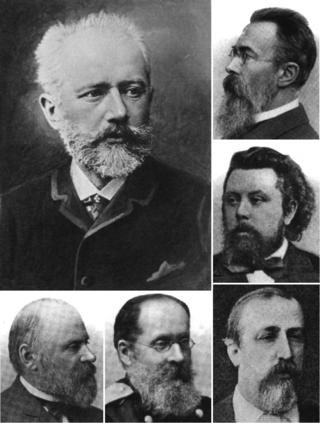
In mid- to late-19th-century Russia, Pyotr Ilyich Tchaikovsky and a group of composers known as The Five had differing opinions as to whether Russian classical music should be composed following Western or native practices. Tchaikovsky wanted to write professional compositions of such quality that they would stand up to Western scrutiny and thus transcend national barriers, yet remain distinctively Russian in melody, rhythm and other compositional characteristics. The Five, made up of composers Mily Balakirev, Alexander Borodin, César Cui, Modest Mussorgsky, and Nikolai Rimsky-Korsakov, sought to produce a specifically Russian kind of art music, rather than one that imitated older European music or relied on European-style conservatory training. While Tchaikovsky himself used folk songs in some of his works, for the most part he tried to follow Western practices of composition, especially in terms of tonality and tonal progression. Also, unlike Tchaikovsky, none of The Five were academically trained in composition; in fact, their leader, Balakirev, considered academicism a threat to musical imagination. Along with critic Vladimir Stasov, who supported The Five, Balakirev attacked relentlessly both the Saint Petersburg Conservatory, from which Tchaikovsky had graduated, and its founder Anton Rubinstein, orally and in print.

Nadezhda Nikolayevna Rimskaya-Korsakova (Russian: Надежда Николаевна Римская-Корсакова listen née Purgold was a Russian pianist and composer as well as the wife of composer Nikolai Rimsky-Korsakov. She was also the mother of Russian musicologist Andrey Rimsky-Korsakov.

Elina L'vovna Karokhina is a balalaika player currently residing in Cliffside Park, New Jersey.

Ayke Agus is an Indonesian classical violinist and pianist, known primarily through her longtime collaboration with the violinist Jascha Heifetz. She is one of the rare classical music performers who has performed as a soloist accompanied by an orchestra as a Multi-instrumentalist.

Isidor Yulyevich Achron was a pianist, composer and music teacher.

Andrej Ivanovich Hoteev was a Russian classical pianist.

Alisa Sadikova is a prodigy classical harpist from Russia.
Victoria Foust, Is a classical pianist and Russian composer noted for her performance of various musical styles, acclaimed for her "passionate and refined" way of playing beyond the limits of traditional concerts creating new styles of music shows where the piano interacts with poetry and visual art through a captivating scenic setting.
The "Song of the Flea" is a song with piano accompaniment, composed by Modest Mussorgsky in 1879. The lyrics are from the Russian translation of Johann Wolfgang von Goethe's Faust.


